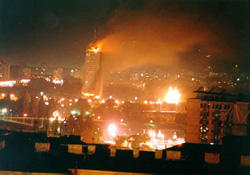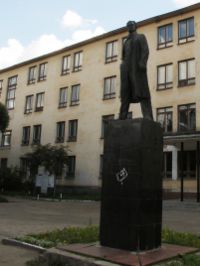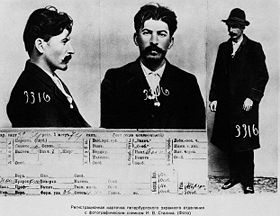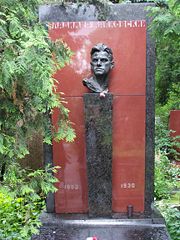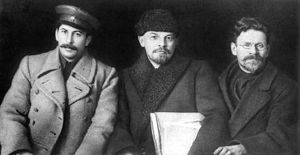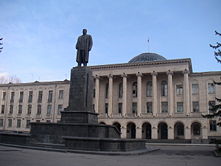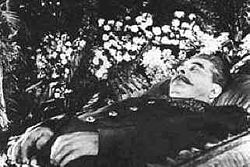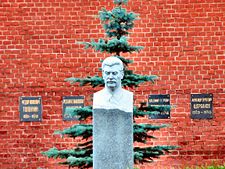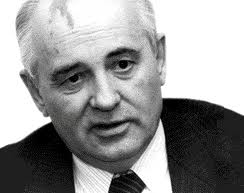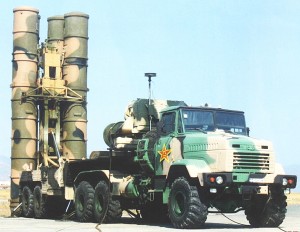Reflections: World Revolution 2
By Alexander Tarasov
SUGGESTED BY SENIOR EDITOR GAITHER STEWART
Scepsis.ru
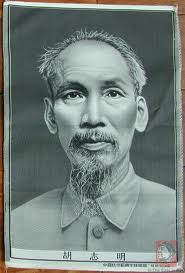
Vietnam’s Ho Chi Minh—father of Indochina’s revolution. An idealist with the will of a mythological titan. The world is currently lacking his kind.
The Return to a Global Revolutionary Strategy Based on the Experience of the 20th Century
Preface to the English Edition
“The World Revolution 2” is an old text; it was written before the global economic crisis, in the late 2005—early 2006. So it happened that Hungarian was the language this text was first published in, in the journal Eszmélet in 2006 (http://www.eszmelet.hu) because the article was based on a paper delivered at Budapest in October 2005. It was only at the end of 2009 that I managed to have the text published in Russian, in the journal Levaya Politika. Then, in 2010, there was a Ukrainian version published in the journal Vpered. That means that the facts of the global crisis are neither analysed, nor even mentioned in the very article.
Nonetheless, they speak for themselves and perfectly prove that the theses and analysis contained in the article are justified. Since this is a preface to the English version, let me focus primarily upon some episodes related to the First World, although I have to be brief.
Firstly, please note that the current crisis is the first truly global economic crisis coming after WWII. It was quite predictable: as soon as the worldwide confrontation between the two systems (the Cold War, that is the World War III which de facto forced the capitalist economy to work as a military one because of the arms race and the impact the fact of confronting the “external enemy” had upon the internal situation) came to an end, the functioning mechanisms of the capitalist economy, well known to us from the Marxist political economy classics, restarted working without distortion again.
Secondly, let me point out that the economic crisis has hit the capitalist periphery the hardest: it is where the UN and FAO have recorded 1 billion hungry people (the figure unprecedented in the world history!); it is where we have witnessed classic revolts of the hungry in Egypt, Bangladesh, Haiti, etc.; it is where the crisis has destabilized the political structures which appeared to be stable, or were successfully stabilized not so long ago (Thailand, Mauritania, Haiti, Kyrgyzstan, Honduras, Mexico, Côte d’Ivoire).
But, typically for a global economic crisis under capitalism, the current crisis started not in the periphery but in the capitalist metropolis. And it is in the metropolis (which accumulates most capital and other wealth!) where the ruling classes tried to do their best to solve the economic problems at the expense of the workers, at the expense of the wage earners. Banks and corporations on the brink of collapse were everywhere saved with cash from the budget (from budgetary funding to direct nationalization, and nobody is making a secret of the act that it is temporary nationalization), i.e. at the expense of the ordinary taxpayer unable to conceal his income by resorting to the “rightsizing” accounting techniques or placing it offshore. The next step was to introduce, under the pretext of “anti-crisis measures”, aggressive neoliberal methods of “cost saving” that is to initiate a new round of counterreforms aimed at dismantling the welfare state.
So how did wage workers of the metropolis respond to this offensive? The attack on their earnings and rights was so blatant and gross, wasn’t it? One could hardly come up with a better test of the revolutionary potential of the broadest masses of workers of the First World.
If one looks through leftist periodicals, whether anarchist, Trotskyite, Maoist, Stalinist, or of smaller tendencies, published in the countries of the metropolis, overoptimism leaps to one’s eye. “The workers got up for their rights!”, “Mobilization unseen in many years”, “General strike, the first one for… (a number of years follows)”, “All trade unions were unanimous for the first time in… (a number of years again)!”, “Revival of the working class spirit!”, etc., etc. Though the tone is quieter and optimism contained in the countries where mass mobilizations and large-scale strikes took place not so long ago. The French left, for example, on the one hand, are boasting of their achievements but, on the other, are already looking for those responsible for the failure (although the struggle seemingly is not over).
It’s clear why. General strikes (especially in the countries which hadn’t seen those for decades) and multi-million demonstrations are impressive, of course, but the result is always the same: the ruling class quietly spits at them and continues their neoliberal counterreforms everywhere. We can see it in Greece, and in Italy, and in France, and in Spain, and in Portugal, and in Germany, and in Britain, and in Ireland. Elections, which do not change anything, serve as a bone tossed to the embittered people: Labour may take over from the Conservatives (in Britain), and vice versa the Conservatives (neoliberal radicals) may replace the Socialists (in Greece) that does not matter; whoever forms the government, it keeps pursuing (and even intensifying) the same policy of counterreforms despite the widest and most impressive protests of the population.
Why is it happening? Because participants of the mass protests in the metropolis, who are wage earners, representatives of the middle class, make no attempt at the founding principles of the System. These classes, which have been for decades bribed with a share of the super profit extracted by monopolies from the Third World and distributed among the general population, are quite satisfied with capitalism, and all they want is to have capitalism with a “human face”. And they are completely unaware of the fact, or rather prefer not to hear about it because it is an unpleasant fact, that such a “human face” in the metropolis can be made possible only by way of looting and overexploiting the periphery. That means their protest is purely defensive (and even conservative where it comes to preserving the vanishing welfare state under capitalism), they think in terms of conformism and reformism.
All the scandalous electoral successes of the ultra-right in various countries, including the Netherlands, Belgium, Sweden, Switzerland, Germany, Denmark, Austria and even Greece, go with the above-said phenomena. The successes are diverse in scale but all are thought-provoking.
Let us recall what was the first response of British workers to the crisis? It was “wildcat” strikes and pickets by energy sector workers clamouring against the employment of foreigners (i.e. their class brothers!), those protests being spontaneous, not organized and not inspired by any right-wing groups, parties, publications.
In fact it is already at this point that the British left should have asked themselves what have they been doing all these decades? Was the failure of the grandiose anti-Iraq war protests, which they were so proud of, an accident?
This is not a question of right/false ideologies, of correct/false tactics. As always in cases like this, this turn of events is rooted in economic causes. In this case, the transformation of the metropolis (the First World) into the collective exploiter of the periphery (the Third World), a collective parasite, is the cause. Exploiters and parasites don’t make revolutions. And if they do, those turn out to be “conservative revolutions”.
Let us compare today’s behaviour of the wage workers of Western Europe with their truly revolutionary behaviour in Europe in the past. Take, for example, the Spain of the early 20th century. A vast number of specialized studies and a larger number of memoirs show us that the Spanish workers (first of all workers, later joined by, among others, rabassaire peasants), when they were coming out for grand strikes and demonstrations comparable in size to the current ones (and even much smaller!), were setting themselves a direct and express task of overthrowing capitalism. But they saw strikes and demonstrations merely as a first stage, as a necessary step on their way to the said end. And even if it was struggle for higher wages or shorter working hours, everyone knew–this is not the real goal, this is only an interim, tactical goal, the real goal is a social revolution, destruction of the power of capital. Therefore, every such manifestation, every such strike could easily escalate into armed hostilities and armed uprising (and even into the proclamation of a workers’ and peasants’ republic as was the case in Asturias in October, 1934). It’s true that anarchists used these tempers for their adventurous ends but it’s only because of this militancy that the struggle of the Spanish workers led in the 1930’s to a revolution, the destruction of achievements of which (that is eventually keeping Spain within the capitalist world) required combined efforts of all three major fascisms of the time: Franco, Nazism and Italian fascism.
The same specialized studies and memoirs (plus statistics) also show us why the workers of Spain behaved the way they did, in a revolutionary, not in a reformist manner. Because they lived under the very conditions, under which the workers of the Third World live today. This is exactly what explains why the masses opened their hearts to the revolutionary organizations’ calls for social revolution.
To put it otherwise, it’s not simply because today the European left, afraid of direct political repression, at best talk of the need to “transcend” capitalism in general, in some distant future but do not call for immediate struggle, including armed struggle, for social revolution. There are those (although few in number and weak in influence) and who do. But somehow their calls fail to ring the bell with wide, and even narrow, masses of the workers.
And the situation will not change as long as the ruling classes of the First World will afford to corrupt, more or less generously, the general population with a share of the excess profits they derive from exploiting the Third World. It is only when this source of profit is minimised, if not liquidated altogether, the ruling classes of the First World will be forced to take such a measures against the workers of the metropolis that will inevitably blow up the class peace, i.e. to refuse to limit the working day, to terminate the dole system, to actually eliminate the social infrastructure, to crack down on protests (for there will be no more money to buy effective compromises). And these circumstances will inevitably lead to the class organizations of workers (such as trade unions) radicalizing, to the capitalist society betraying its class nature, to the general public opening up to the revolutionary propaganda, and consequently, to the class struggle reviving in its original, violent and ruthless form, and then to a social revolution.
And however strong the class enemy can be, the social revolution in the metropolis will have a chance to win because it will take place in favourable circumstances –in the circumstances when it will have a powerful rear base and strong support in the form of a revolutionary Third World, and this revolutionary Third World will act as a material checking, restraining and demoralizing factor in relation to the forces of counterrevolution in the metropolis.
2-5 December 2010
Preface
I would like to draw the reader’s attention to the fact that this article was written between October 2005 and January 2006, that is, almost four years ago. Therefore, all comparative dates in the text (for example, “15 years ago”) should be understood as from the perspective of when the article was written. This also applies to all statistics and other examples in the text.
To my surprise, I initially failed to find a single publisher- either paper or electronic, including those who consider themselves to be on the far-left who would agree to publish the text. For some reason the article provoked shock and seemed to many to be “too radical” (in general, or because of the “current climate”).
Therefore, when the opportunity arose to publish it I decided in principle not to change a single word, and to leave it just as it was four years ago. I did so in order to give the reader the opportunity to also ponder the question: just what is it about this text that other editors have found to be so seditious?
However, I could, of course, offer a number of examples of sedition. Take, for instance, the example of the elections in Guatemala where Rigoberta Menchú confidently won in districts where the population speak K’iche’ Maya, not Spanish. She lost, however, in an almost identical social environment where the Spanish speaking population proved unable to resist the subtle pre-election populism of the bourgeois parties. Or, the example of Nepal where, after coming to power the Maoists decided to translate their entire literature and propaganda into English. Consequently, experts and specialists from India (and the U.K., and probably the U.S.A.) were able to make use of this newly translated information in order to quickly develop strategies for their agents in Nepal. This in turn has created serious problems for the Maoists. Or, consider the example of Colombia, which is, as far as I know, the only country where not the right but the left (FARC-EP) have tried to destroy infrastructure by exploding oil pipelines and power lines, etc. In response, other leftists stigmatized or mocked them (depending on their degree of sympathy for the FARC struggle), and they finally managed to persuade FARC to abandon such tactics on the grounds that they were ‘alien’ to the class. Meanwhile, before the start of this campaign FARC could scarcely count on 4.5 thousand supporters, yet towards the end of it they had twelve thousand. This testifies the correctness of their materialist approach to politics (and let us not forget that politics ultimately boils down to economics). Finally, I could write about the frenzied demand of the U.S. administration which, at the end of the George W. Bush era, decided to automatically use military force against any country which tried to limit U.S. access to hydrocarbon resources. That is to say, the experience of the past hundred years has shown us time and time again that the right (i.e. the capitalists) have, in practice, been even more materialist than the left! The left will have no victories to celebrate unless this situation changes, and unless they stop opposing armed resistance from a moral perspective. Concealed idealism will ultimately come back to haunt you.
Aleksandr Tarasov
3-7 September 2009
The world-historic defeat of the Soviet Bloc in the Third World War (i.e. the Cold War) gives us the opportunity to finally return to the topic of a global anti-bourgeois revolutionary strategy.
During the 20th Century such a strategy (i.e. one based on a global vision and a class approach) presented itself on two occasions: the first was offered to the Bolsheviks, who knew very well that the fate of the Russian Revolution depended on a world revolution, and that the “building of socialism in one country” was impossible. Hence, they quite deliberately prepared for world revolution, and to this end, the Comintern was created.
Originally, world revolution conceived itself as a revolution in various European countries, yet the Bolsheviks soon moved their attention to the countries of the Third World, and primarily to the colonial and semi-colonial Asian countries.
This strategy was rejected after the Stalinist counter-revolutionary Thermidorian coup. The petty bourgeoisie which came to power in the U.S.S.R. during this period (more specifically they were the bureaucracy, but their social background was mostly rural petty-bourgeois) were not interested in continuing the revolution, the revolutionary struggle, of the risks associated with it. Like any bourgeoisie, it strove to achieve stability (and the fact that in the specific Soviet context the bureaucracy was only a virtual petty bourgeoisie does not change a thing, for stability is a category of social psychology, social action). The revolutionary strategy of class conflict was replaced with the counter-revolutionary strategy of Realpolitik. The class position was replaced by a state one, that is, oppositional classes and their political representatives were replaced with oppositional states, and later, military-political blocs (i.e. NATO against the Warsaw Pact, the West against the East, etc.). This served to return to a classical politics, which always creates for states in the international arena the foundations of class exploitation.
The establishment of social order in the U.S.S.R. (and later in its satellites) was a form of superstatism (for more on superstatism see my article “superstatism and Socialism” in Svobodnaya Mysl’, 1996, №12), based on the combination of an industrialized mode of production with public ownership of the means of production. This formed an alternative capitalism (alternative in the true sense of the word, meaning a choice between two or more equals) in the singular framework of an industrialized mode of production. Its objective was for a peaceful inclusion in the capitalist world economy, and it was not geared towards an all-out military struggle.
Of course, from the period of Stalinism onwards the Soviet elite were ready to give up their confrontation with the bourgeois world. However, they were unable to do so because of the nature of the bourgeois world itself: the ruling classes of the capitalist world were so shaken by the Bolsheviks’ expropriation of the means of production that the cessation of the conflict between the U.S.S.R. and capitalist countries could only be achieved by returning all expropriated property to its former owners and by imprisoning the Bolshevik expropriators. Understanding this, the Stalinist and also the post-Stalinist leadership decided to continue their statist, militaristic and ideological confrontation with the West. Yet the more they did so, the more their leadership came to be legitimised solely by appeals to the slogans of October 1917.
However, the strategy of state opposition was from the outset doomed to failure: to those familiar with the history of exploitative class societies, it was a typical and familiar strategy based on state mobilization, i.e. in the long run the mobilization of material, technical forces in opposition to monetary finance and its material and technical forces and resources (including military and manpower). Evidently, the U.S.S.R. (even with its satellites in tow) was weaker than the rest of the world (i.e. the capitalist world), for it had fewer resources. In addition, unlike the West the U.S.S.R. was unable to openly loot and exploit the countries of the Third World. This was due to reasons of an ideological nature: basically the Soviet superetatist elite were forced to make reference to a socialist ideology which in essence was alien to them. It was a façade, a cover.
Consequently, the defeat of the U.S.S.R. and its allies in this global confrontation was simply a matter of time. This defeat occurred 15 years ago—before our very eyes—soon after the volume of capitalization of some of the Western TNCs had become greater than that of the U.S.S.R. It is essential to understand that in the world economy the Soviet Union acted as a huge monopoly. It was compelled—unlike Western monopolies—to (1) compete with all kinds of products, and (2) waste a huge portion of its profits on the maintenance of its armed forces and social services. Class conflict, unlike the state, is now developing according to different laws and is based upon a different principle: it is not a struggle between various countries and blocs, or between opposing forces ready to wage total war and wipe out entire populations, economies and territories. Rather, it is the struggle of opposing class forces for the same thing: national-economic objectives (and resources). Neither side in this struggle is interested in the destruction or annihilation of these objectives and resources. Not even the most reactionary right winger would consider dropping a nuclear bomb on his own factories if the workers took control of them. This provides real scope for a victory for revolutionary forces, even when their opponent is objectively stronger.
The second time a global revolutionary strategy presented itself in the 20th Century was in Ernesto Che Guevara’s famous “Message to the Tricontinental”. If we recall, Che declared the U.S. to be the enemy of mankind, and called for establishment of “two, three, many Vietnams” in the countries of the Third World. He did so in order to 1) undercut the basis of imperialism by wrestling the commodities, energy sources and economies of the Third World away from the imperialist countries, and to 2) engage imperialism in a number of local military conflicts in the capitalist periphery so as to cause it to economically stretch itself to the limit. In fact, Che proposed a global strategy of guerrilla war within the territory of the First World itself so that the enemy could not rest even in the capitalist metropolis, and so that it would be compelled to carry on the armed struggle on its own turf, and finally, so that this struggle would compound its economic and political problems by inevitably pushing the First World towards open class conflict.
Che proposed this strategy to all opponents of imperialism including, of course, the Soviet leadership. Although he held no illusions about the U.S.S.R., Che understood that objectively speaking the USSR was—despite the will of the Soviet nomenclature—an opponent of Western imperialism. However, as Che no doubt anticipated, the counterrevolutionary Soviet leadership rejected his strategy as a form of “adventurism”. Indeed the label “adventurist” was assigned to all supporters of Che Guevara’s strategy. What is clear is that by the end of 1960s and the start of the 1970’s the Soviet nomenclature – like a social collectivity – was already preparing to become not only leaders but owners. That is, they were prepared to renounce their socialist ideology (which was alien to them anyway) and include the countries of the Eastern Bloc in the world capitalist system. Even the “oil crisis” of the 1970s, which clearly demonstrated the correctness of Che’s position, did not influence the stance of the Soviet nomenclature.
Meanwhile, the imperialists themselves actually came to appreciate the strategy proposed by Che Guevara. It is no coincidence that Zbigniew Brzezinski later cynically confessed that during Reagan’s era, the strategy of “two, three, many Vietnams” was consciously adopted by Washington against the Soviet Union: the USSR was forced, to varying degrees, into a number of conflicts around the world (in Afghanistan, Poland, Ethiopia, Angola, Mozambique, Cambodia, Nicaragua) to ensure that the Soviet economy would stretch itself beyond its capabilities. Che’s strategy, as one might expect, was successful.
What is more, features of this strategy were actively used by the U.S. to destabilize leftist regimes. For example, during the period of Allende a de facto guerrilla war was deployed by the ultra-rightists in Chile to purposefully destroy national-economic facilities and infrastructure (this included blowing up bridges, roads, power lines, power plants, mines and so forth). This quickly created extraordinary economic problems, which in turn provoked dissatisfaction with Allende’s regime to the extent that a significant part of the population successfully prepared the military coup of September 11, 1973.
The practice of economic embargos, which intentionally aim to deprive regimes of resources and commodities, is still widely used by the United States in order to destabilize those regimes which it considers to be objectionable.
The transferring of hostilities to opponent’s territories (“the exportation of counterrevolution”) was tested with success in Afghanistan (from Pakistan’s territory), Mozambique (from the territory of South Africa), Angola (from the occupied territories of Namibia, South Africa), and Nicaragua (from the territory of Honduras).
At the same time, in no cases did the opponents of imperialism try to use their own territory as a rear base for an active guerrilla war so that the forces of revolution could systematically and successfully attack the class enemy. Nowhere did they carry out the mass strategy of destroying infrastructure in order to destabilize the economy. No one tried to block, paralyse or destroy the traditional means in which the material resources of the Third World are expropriated by the First World. Nobody even tried to cause damage to the stock exchange by hacking into its computer systems (even though this is quite easy to do!) and so on and so forth. On the contrary, those weaknesses are forced weaknesses because of limitations in the people and in the means. Attempts to carry the war to the metropolis, attempts which made revolutionaries in the First World, exposed the Soviet leadership as counter-revolutionaries. Yet the Soviet elite threw labels at the revolutionaries such as “provocateurs” and “CIA or Beijing agents”, and in doing so the Soviet elite, with great satisfaction, took the logic of their political enemies in Washington by equating revolutionary armed struggle with terrorism.
But if Che Guevara’s analysis was correct in the late 1960’s, it is even more so today. In the last decades of the 20th Century – and especially since the collapse of the Soviet Union and the Eastern Bloc – the industrial sites of the First World have, with increasing frequency, been either indefinitely or temporarily closed down whilst industrial production has been transferred to the Third World. Indeed the tactic was later employed of actively curtailing industrial production in the First World in order to transfer industrial production to the countries of the Third World. This means that metropolises are in fact materially dependent upon the periphery, and as such they are becoming ever more vulnerable to the strategy of global guerrilla war.
If we compare the data from six different international economic reference books pertaining to the period from 2000—2002, we can quite clearly see the dependence of the capitalist metropolises (including Australia, New Zealand and Israel) upon the periphery:
>> energy – 52% (and if we take only hydrocarbons, then that figure rises to 79%);
>> metals – 81%;
>> raw materials for chemical industry – 89%;
>> raw materials for food industry and agricultural products – 46%;
>> raw materials and finished products for light industry – 67%.
However, this dependence is actually even greater for official statistics do not reveal a complete picture. Take, for instance, the example of maquiladoras. Mexican maquiladoras are divided into three categories depending on their legal status. As it turns out, production of the third category of maquiladoras (using the right of exterritorialy) is not included in Mexican statistics, whereas it is included in the U.S. statistics; though these factories are located outside the U.S.A., and their workers are not U.S. citizens but Mexicans (whom the North American statistics surely do not count). Thus, we arrive at the situation when by recording the products of American companies made in maquiladoras, the U.S. official statistics not only exaggerates the total production output of U.S.A. but also overstates the productivity of American workers’ labour.
There are plenty of particular examples that prove the discrepancy between the official statistics and the actual situation. For instance, once upon a time I had a computer brought from the U.S.A. According to all the documents, it was a “white produce” PC manufactured in the Silicon Valley. When the computer broke down and was dissembled it was found out that the Silicon Valley had produced only the motherboard while all other components had been made in Taiwan, Indonesia, Singapore, Malaysia, Thailand, India, and South Korea. Although, doubtlessly the statistics had already counted that computer as one made in the U.S.A. Here is another example: one of my former students, who lives in Munich now, bought her husband a suit for solemn occasions in a store that sold only expensive German menswear. According to all documents, the suit appeared to have been produced by a well-known and reputable German company. It was only at home, when she was ironing the trousers from the inside, did she discover a tiny tab hidden in a seam which read the suit had been actually sewn in Orsha, Belarus. Once again, there is no doubt, that this product was counted by the statistics as produced in Germany.
In other words, the capitalist metropolis (the First World) has turned into a collective exploiter of the capitalist periphery (the Third World). Thanks to superprofits extracted by the western monopolies from the Third World, a massive bribery, through the redistribution of income in the tax system, of the public is going on in the First World that extends to the broad masses of workers. That means that the metropolis is assuming increasingly more visible attributes of a parasitic formation, just like the metropolis of the Roman Empire which lived at the expense of exploiting and robbing the provinces and neighbouring lands.
The ruling strata and classes’ corrupting the workers is not new: this phenomenon had long been described by classic Marxian authors illustrated by the “labour aristocracy”. What is special today is that the enormity of superprofits makes it possible to extend this strategy to broader masses of population.
Moreover, the ruling strata and classes of the capitalist metropolitan states having taken warning by the Bolshevist and other revolutions, consciously pursue the policy aimed at reducing the number of the working class (and first of all the industrial proletariat) to a minimum in the countries of the First World in order to change the class structure of their populations, increasing the number of small owners and individuals employed in services and entertainment, individuals directly dependent on the interests of the ruling classes and often belonging to the parasitic or semi-parasitic social groups. Shopkeepers, lackeys, prostitutes and clowns displace those who with their labour produce material wealth—the foundation of any civilization.
That means that the traditional working class orientation of the left in metropolitan countries is doomed to failure: firstly, because the corrupted working class cannot be revolutionary; secondly, because the working class itself is rapidly diminishing that obviously leads to the decline of its influence in the society. The fact that social-democrats and labourites had degraded to neoliberals is not accidental at all and surely is not a product of somebody’s evil will: it is a natural response to the social changes underway in Western Europe.
Hence it appears that there are no perspectives for a revolution in the countries of the First World (parasites and exploiters never become revolutionaries), and that revolutionary centres have shifted to the countries of the Third World. The left in the First World countries have no future provided, of course, one does not accept a repetition of the disgraceful way of the European social-democrats and labourites, who have betrayed their ideals and turned into an instrument of big capital, as their “future”. It is highly demonstrative that the contemporary left of the metropolitan countries have failed to offer strategies for the struggle other than reformist ones: struggle for minorities’ rights, for women’s equality, for the rights of immigrants and homeless, defending the environment and so on, that is they have offered actions aimed at improving capitalism partially (which helps to make capitalism more attractive to a greater number of people and thus decreases the number of socialist fighters) not at destroying it. And certainly all this does not pose any threat to the rule of capital.
As does not the so called antiglobalism, all the more so in its cynically reformist form preached by ATTAC (taxing financial transaction implies worrying about the prosperity and expansion of the same transactions), and in its carnival disguise which the Western left like so much (carnival by definition is not a struggle but a spectacle; as Metternich used to say, unless people stop dancing they are not dangerous.
As far as organization is concerned, the strategy proposed by the “antiglobalists”—mass movements instead of “totalitarian” strictly-centralized organizations—is dead-end because firstly, these movements are transparent to the class enemy and its secret services; secondly, the political adversary has already found and practically tested a remedy against this strategy: it has learned to create, resorting inter alia to bribery, mass public movements of counterrevolutionary, reactionary character. The experience of “colour revolutions” in Yugoslavia, Ukraine and Georgia (and less known affairs in Bulgaria and Romania) have demonstrated it.
The contemporary Western left have exposed their pettiness when they failed to head, let alone organize, a single event of massive radical counteraction against the neoglobalism politics in the countries of the First World, from the street fights between fishers and dockers, and the police in Spain to with the riots in French HLM’s.
Nonetheless, there is a chance to save their reputation for those of the First World left who consciously spend all their time and efforts, give all their life to the revolutionary struggle in the countries of the Third World. Actually, some Western left of the 1960’s and 1970’s furnished relevant examples already in the 20th century—those French, Spanish, Italian comrades who joined the guerrilla in the countries of the Third World; those North American left who decided it was necessary to come to Venezuela to serve advisors to the government of Hugo Chavez, and those who (like RAF in West Germany) openly declared themselves armed agents of revolutionary forces of the Third World in the First World.
Generally speaking, the viewpoint which Moscow imposed on the world left movement during the soviet period and according to which the most developed capitalist countries stand closest to a socialist revolution, is not a Marxist point of view, not dialectical, and not scientific but positivist. Marx himself was a dialectician and understood well that social progress in class, exploitative societies takes place outside of the positivist schemes but is implemented by those forces which have previously fallen a prey to this progress, and explicitly wrote so in “The Poverty of Philosophy”.
The only promising global revolutionary strategy today is the strategy of creating revolutionary focuses in countries of the Third World, establishing horizontal ties between those pockets that would ignore the First World and its primary imperial cultural institutes and languages, and subsequently raising the arms, organizing riots, creating “liberated areas” and seizing power in separate countries which then must consciously become logistical bases of the world revolutionary process.
It was impossible to implement this strategy in the early 20th century: the superetatist revolutions similar to the Bolshevist revolution, de-facto solved the tasks of bourgeois revolutions (industrialization, resolving the agrarian question, and cultural revolution), therefore the countries of the then periphery and semi-periphery (where strictly speaking the anti-bourgeois revolutions broke out) were forced to learn from the metropolitan countries, borrow their culture and technology. Furthermore, the horizontal links, because communications and information technologies had not been developed yet, and nations of the world were isolated, between the revolutionary forces of the periphery countries were extremely difficult to establish (that is why, for example, revolutionaries of the colonies of the British Empire had to communicate via the metropolis and in the metropolitan language).
Globalization removes those obstacles. Moreover, there is no need to turn to the culture of the modern West as this is a culture of degradation: since the 1970’s the culture and human sciences of the metropolitan states corrupted by post-structuralism and post-modernism, have not presented any major achievements to the world; and by the way this is typical of parasitic societies. In the early 20th century, capitalism was on the rise, the bourgeoisie—if one looks at it not from national perspectives but from a planetary point of view—still was a rising class first of all associated with the real material production. However, today capitalism has reached the limits of its qualitative growth continuing to develop only in quantity, predatorily exhausting the planetary resources, and the bourgeois class is connected first and foremost with the sphere of finance—and even within this sphere primarily with speculative, virtual capital. The capitalism of today has no experience that would be worth borrowing by the anti-capitalist forces.
The victory of mass culture in arts and literature, the victory of post-modernism and the rejection of the scientific approach in human sciences, the victory of “multiculturalism” and “political correctness” in social life, the victory of obscurantism, religious fundamentalism and neoliberalism in the ideology of the contemporary West is not accidental but logical and is explained by the parasitic nature of metropolis. The art and literature, philosophy and humanities of the modern West no longer has any progressive social value (this equally applies to the Western left; one can simply compare the outright mass-culture Tony Negri’s bestsellers “The Empire” and “Multitude”, which are within an ace of gutter press, with his really serious and truly pioneering works of the 1960-70’s). We have finally made it to the day when we need not and should not learn culturally from the developed capitalist countries (there is nothing we can learn there) but should instead develop independently on the basis of the opposition to the bourgeois “culture”.
Unfortunately, the technical superiority of the First World cannot be ignored. This concerns not only the military superiority but, first and foremost, the superiority in the field of surveillance of the political and public scene, of organizations and individuals, control of social behaviour and social actions. Imperialism actively develops and implements, with the help of secret services that have received exclusive rights and powers (this is exactly what the “antiterrorist” hysteria was unleashed for), methods and mechanisms of total surveillance and total control and, consequently, total suppression.
That means that generally only those revolutionary forces, which will not be transparent to imperialism. will be able to survive, hold on and create revolutionary pockets of resistance In other words, the revolutionary forces require areas of autonomy. The experience of the 20th century showed that the organizational forms, which had ignored the laws and will of the class and political enemy and which the class and political enemy had failed to influence because of the lack of information about the situation in the areas, could be the effective areas of autonomy. So are, for example, underground or partisan parties.
The class and the political enemy imposes its rules through the state as a machinery of direct class suppression and through the “civil society” as a duplicating system of class suppression (formally independent from the state). It was Gramsci who once noted that exactly because there is this duplicating repressive system, the “civil society”, under capitalism, the revolutionary forces will be able to win only if confront the institutes of the bourgeois “civil society” with institutes of its own anti-bourgeois “counter-civil society”, that is if they create such a social sphere that will be opaque for the enemy and closed which it cannot enter. The experience of the 20th century demonstrated that such were the territories of revolutionary culture and institutes of revolutionary “civil society” most completely implemented in the practice of guerrilla (the experience of China, Vietnam, Cuba, Guinea-Bissau, Nicaragua).
And all the attempts to play at somebody else’s ground, in the bourgeois “civil society”, suffered an inevitable defeat as they were made in pursuance of the strategy of legal activity on the enemy’s terms, inside this society (with an illusionary aim of “seizing the hegemony”) instead of the strategy of demolishing, eliminating the bourgeois “civil society”.
It would be correct strategically not to duplicate the institutes of the bourgeois “civil society” and bourgeois cultural institutes but to reject them, replace them with different institutes—the institutes, which are required to perform the tasks of the world revolution. It was no accident that the U.S.S.R. after the 1920’s and the Eastern Bloc countries were very bourgeois in their cultural (and lifestyle)—they were not revolutionary countries. Conclusions should be drawn from this grievous experience, and mistakes of the Soviet Union and other superetatist states should not be repeated. To put it otherwise, one must already today to study thoroughly (and critically, of course) the early revolutionary cultural and social experience of Soviet Russia of the 1920’s, the first revolutionary years of Vietnamese, Cuban, Nicaraguan and other revolutions.
Finally, rejecting the major languages of the world imperialism, first of all English, is an essential prerequisite for victory. The U.S. as the world policeman quite consciously impose English as the international language upon the whole planet: it facilitates controlling the planet. It is not accidental that all recent achievements of radical antibourgeois forces, even though local, were made possible where these forces ignored the English language (and tried to avoid using other languages of the world imperialism such as French and German): Chiapas where revolutionary propaganda was conducted in Maya languages; Ecuador and Bolivia where revolutionary propaganda was carried out mainly in Quechua and Aymara languages; Nepal and India where the Maoist rebels are conducting the propaganda in local languages (and in the last resort in Hindi and Nepali). In other words, the world imperialism has made a muff of those pockets of resistance exactly because of its imperial overconfidence: it believed that all important documents would surely be translated into English.
The boycott on the metropolitan languages (on English mandatory) in horizontal links between the revolutionary forces of the periphery, accompanied with studying of each other’s languages, will make these forces far less transparent to imperialism and, therefore, much more dangerous for it.
The strategy of the world revolution as a world guerrilla war coming from the Third World is a long-term strategy (even for local actions). The experience shows that preparing any armed resistance focus requires much time: it took 20 to 25 years to get ready for the uprising in Chiapas; 20 years for the preparation of the guerrilla of Sendero Luminoso in Peru; the Maoist guerrilla in Nepal and India was started by organizations created in the underground (or gone underground) in the late 1960’s; the victorious massive street riots in Ecuador and Bolivia were organized by unions of the Indians created in mid 1970’s. Hence it follows that this strategy has nothing to do with the notorious “putschism”, “making a revolution in 24 hours” which our and Western “academic left” eagerly speak about (and criticize). These “academic left” with this criticism simply mask their own cowardice, their own inability to struggle actively, and their own vested interest in maintaining the status quo: they are more or less well-lodged within the bourgeois society and are afraid of losing what they have as a result of some “abrupt movements”. Holding “scientific conferences” is the favourite activity of the “academic left” (at their loose hours when they are free from duty in the bourgeois academic institutes and writing academic papers for the bourgeois academic journals). But the world history does not know any single case when scientific conferences would bring about a social revolution!
One can predict in advance that since the revolutionary centres have shifted to the capitalist periphery, the countries of the “New Periphery” (countries of the former Eastern Bloc) as countries belonging to, or claiming the status of, the semi-periphery, will be the last to join the revolutionary struggle. Some of them—those which will actually manage to become semi-periphery countries (so far Slovenia alone has clearly managed to do so)—will be the last by virtue of the very status of the semi-periphery. The remaining one because two prerequisites must be met for a successful development of the revolutionary movement in these countries (and it requires a lot of time):
(1) alternation of generations must occur: the “Soviet” generation, obviously lost for the revolution, must step down, and the generation of those who have been indoctrinated by unbridled anti-communist propaganda soaked up in adolescence, the generation of those who have cheered the coming of capitalism, must follow suit;
(2) the tradition of independent radical left opposition destroyed under the counterrevolutionary Stalinist bureaucracy rule, must come about.
At last one needs to understand that territories liberated from capitalism by the revolutionary forces, and it also applies to entire countries, cannot be anything but rear bases for the world revolution. The experience of the U.S.S.R. shows that any other approach, other strategy are suicidal. Objectively there are no conditions today for carrying out a socialist revolution: nowhere in the world the productive forces have developed enough to go beyond the economic formation and the industrial mode of production. (All the tales about a “post-industrial” society are ravings originated by the parasitic nature that the First World has assumed. If one follows this logic then the richer districts of capitalist cities have always lived in a “post-industrial” society). Therefore, one should distinguish the concept of antibourgeois revolution from the concept of socialistic revolution in order not to deceive oneself and others. The upcoming anti-bourgeois revolutions will necessary be superetatist, and the societies brought up by these revolutions will be egregiously imperfect, superetatist, and they are justified because they will become the areas of social and economic, and cultural experiments (during which new, post-bourgeois culture, psychology and social relations will take shape by the method of selection) and will serve bridgeheads for revolutions in other countries, revolutions a chain of which will in the end do away with world capitalism.
In this sense, the negative experience of the superetatist countries (the U.S.S.R. and others) is invaluable as it allows for forming a clear picture of the dangers that objectively threaten the victorious anti-bourgeois revolutions, in advance.
A socialist revolution, which can only be worldwide and which will not run in the same pattern common for the bourgeois and superetatist revolutions, is a matter of the distant future. However, our contemporaries will witness, and may join, antibourgeois revolutions. And, lastly, one should keep in mind that the future is open, and if this strategy is not implemented for any reason by the left, some other adversary of the First World can realize it, for example, Islamist radicals can, who today act as a force regionally resisting the Western imperialism but who, if the left continue to be passive, may become a global force (and this very anti-imperialistic potency makes Islamic radicalism so attractive in the world; it is not accidental that every year in Germany 10,000 Germans get converted to Islam)
10 October, 2005-18 January, 2006
Published in The Future Present (L.). 2011. Vol. 1. N 1.
_____________________________________
ABOUT THE AUTHOR
Alexander Nikolaevich Tarasov is a Soviet and Russian left-wing sociologist, politologist, culturologist, writer and philosopher
Let’s keep this award-winning site going!
| Yes, audiences applaud us. But do you?If yes, then buy us a beer. The wingnuts are falling over each other to make donations…to their causes. We, on the other hand, take our left media—the only media that speak for us— for granted. Don’t join that parade, and give today. Every dollar counts. |
|---|
| Use the DONATE button below or on the sidebar. And do the right thing. Even once a year. |
Use PayPal via the button below.
THANK YOU.
//




